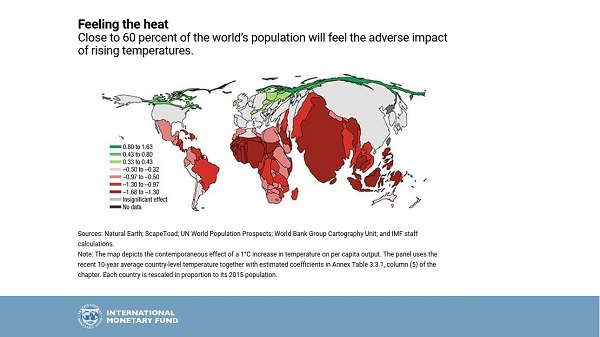
The effects of higher temperatures will not be equal everywhere and the brunt of the adverse consequences will be borne by those who can least afford it: low-income countries.
By Sebastian Acevedo, Mico Mrkaic, Evgenia Pugacheva, and Petia Topalova (IMF Blog)
The Earth’s temperature is rising and its climate is changing. The increase in temperatures will shape the economic future of communities and countries across the globe. All countries will feel the direct negative effects from unmitigated climate change. But as our research in Chapter 3 of the October 2017 World Economic Outlook shows, the effects of higher temperatures will not be equal everywhere and the brunt of the adverse consequences will be borne by those who can least afford it—low-income countries.
Warming at an unprecedented rate
Over the past four decades, the global average surface temperature has increased at a pace that is unprecedented in the past 20,000 years. And temperatures are set to rise further, at a scale very much dependent on our ability to restrain greenhouse gas emissions, the key human driver of global warming. Extreme weather events, such as heat waves, droughts, and floods, are likely to become more frequent, and sea levels will rise.
Hurting the poorest the most
The Earth’s warming affects countries very unequally. Even though low-income countries have contributed very little to greenhouse gas emissions, they would bear the brunt of the adverse consequences of rising temperatures, since they tend to be situated in some of the hottest parts of the Earth.
Analyzing historical patterns across 180 countries over the past 65 years reveals a non-linear relationship between temperature and growth, confirming previous findings by Burke, Hsiang, and Miguel (2015) in an expanded database. This relationship implies that in countries with a relatively hot climate, such as most low-income countries, a rise in temperature lowers per capita output in a long-lasting manner.
Read the complete story at IMF Blog
——
See also:
- University Building Resilience towards Climate Change
- Ethiopia’s gift to the world – is it too late to save coffee?
- Warmer Climate Threatens Malaria Spread in Ethiopia: Study
- Ethiopia’s Coffee Farmers Are ‘on the Front Lines of Climate Change’
- Drought: The New Normal in East Africa? Should the Indian Niño Be Blamed for Drought?
